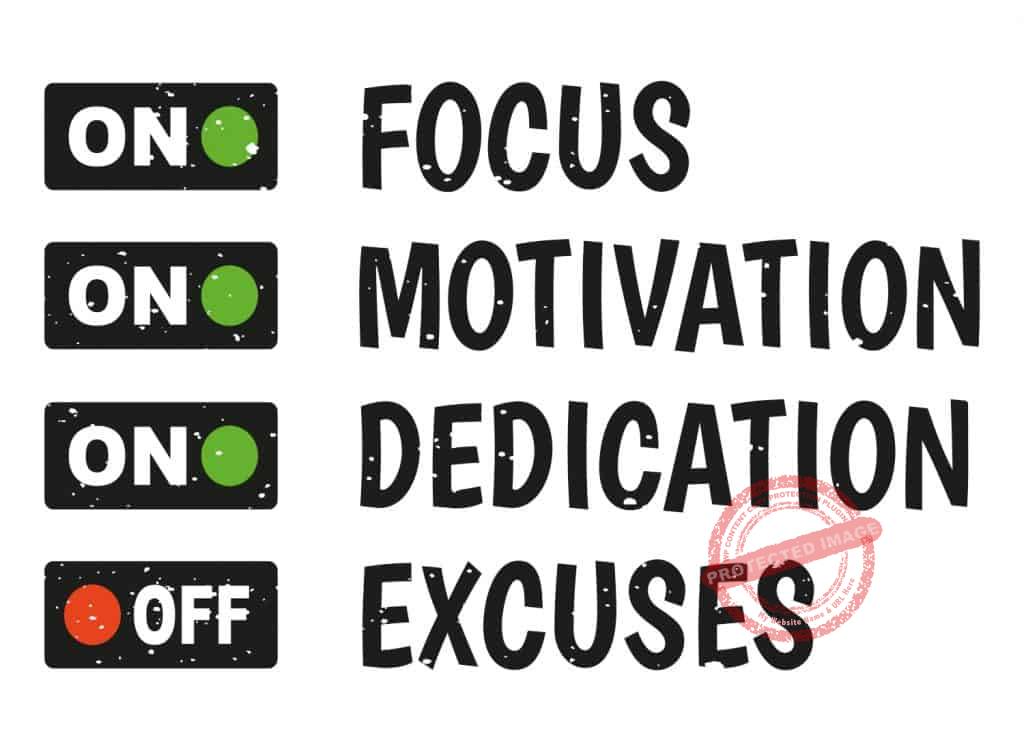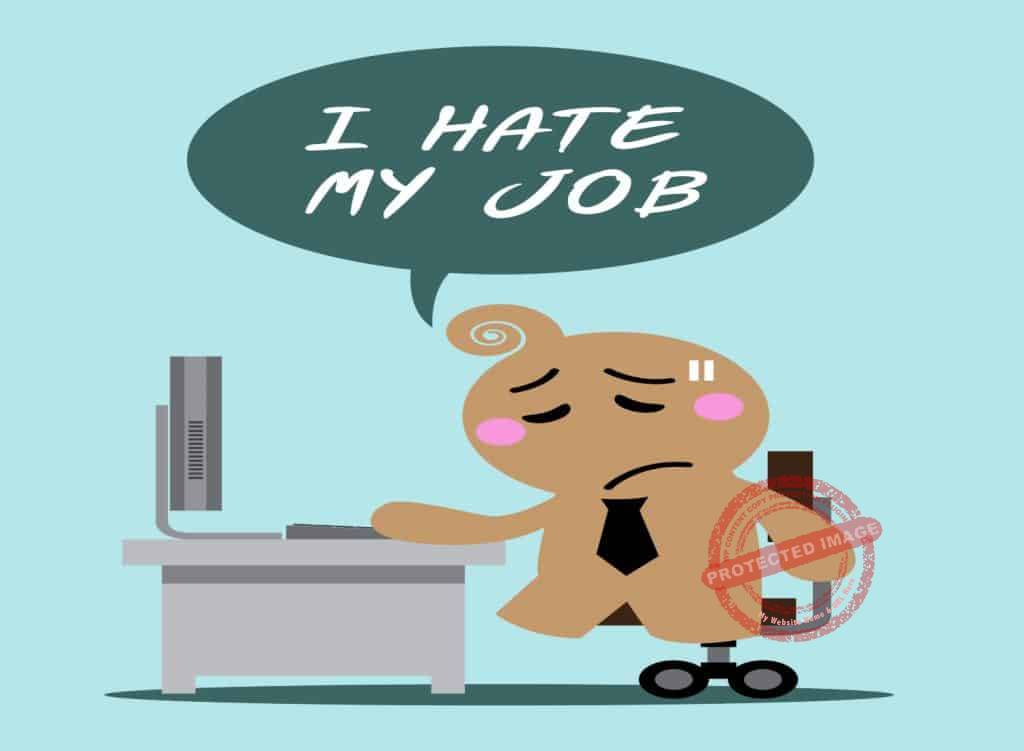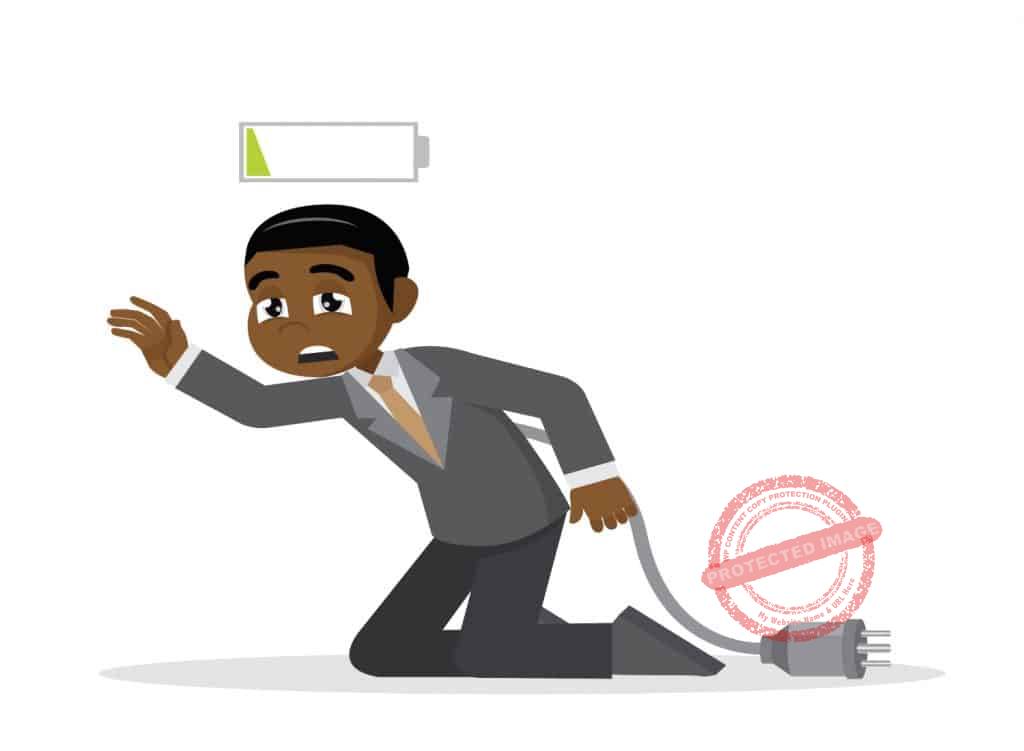Want to know how to make yourself work even when you don’t want to? Then you are in the right place! Read on!
Don’t we all have those days when we simply can’t get ourselves to work?
Sure enough, everyone has those days once in a while.
So, we let the day pass us by, ignoring the amount of work that’s before us.
When night time comes, or when the deadline is close, we scramble to complete as much as we can all the while regretting our decision of not doing it at the proper time.
Why do we cause ourselves such misery?
Why, despite the certain and undesirable consequences, do we procrastinate?
Is our motivation level really the culprit?
Is it our inability to appreciate the value of time? Or is it something else?
We’re going to answer these questions in this article.
But first, let’s look at the psychological standpoint of motivation.
The Psychology Of Motivation

If you feel the desire to move towards a goal, then you are motivated.
Hence, ‘motivation’ is defined as ‘the drive an individual has for acting in a certain way and his or her willingness to do something.’
It is that feeling that spells the difference between waking up early and going to work versus waking up late and staying in bed all day for no apparent reason.
Motivation originally has two types: intrinsic and extrinsic.
Intrinsic motivation comes from within a person while extrinsic motivation is derived from outside sources.
A third type is called ‘amotivation’ which is defined as the ‘absence of either intrinsic or extrinsic motivation.’
If you don’t feel like working or doing anything, you are ‘amotivated.’

Now, motivation is a niche topic.
That’s because there are various ways at which motivation can be discussed depending on the context.
For example, if you’re talking about motivation in the context of human development, then the language will be different depending on who needs motivating.
You may be talking about motivation levels among children, among adolescents, among adults, and among seniors.
You may also be talking about motivation in the workplace, at school, in healthcare, and so on.
This makes motivation one of the primary topics in psychology and human development.
In fact, motivation is one of the concepts in psychology that has the richest literature.
In this article, you’re going to be reading about motivation, how to get things done, and motivation tips in the context of the workplace.
Understanding Motivation In The Workplace

In 2006, Harvard Management Update published research called, ‘Stop Demotivating Your Employees.’
The paper has proven its ability to challenge the way some organizations handle employee motivation.
In fact, the paper itself was approached with a different viewpoint.
Instead of looking at motivation through the eyes of organizational leaders, it looked at motivation where sometimes it mattered more.
It looked through the eyes of the employees.
So, the research offered an interesting claim.
It claimed that companies do not have to actually implement measures to motivate their employees.
What they need to do is to stop demotivating their employees.
This claim is supported by the findings of David Sirota, Louis A. Mischkind, and Michael Irwin Meltzer.
In their study, they’ve surveyed over 1.2 million employees at various companies from 2001 to 2004.
52 companies included in the survey were Fortune 1000 companies.

What the researchers found was that most employees started their new work with high levels of motivation.
However, in just six months, this motivation level declined and continued to do so in the years that followed.
This trend was observed in roughly 85% of the companies included in the survey.
What caused the decline in motivation level?
The answer was in the management itself.
The researchers revealed that the primary demotivators [motivation-reducing-factors] among employees were as follows:
- Some employees who were initially referred to as ‘the greatest assets’ became expendable at the first hint of business difficulty.

- A number of employees felt that they weren’t given adequate recognition and reward, pointing out the lack of acknowledgment or credit.
Also, the management’s preference to deliver criticism or poor performance more than appreciation for good work.
- Others felt that management policies hindered them from excelling in their jobs.
Policies like unreasonable approval requirements, paperwork, lack of training, lack of or failure of communication, inconsistent delegation, and most of all, the lack of vision.
On top of all these, management style and manager behavior were also found to have affected employee motivation.
Now, while there are external demotivators, there are also internal demotivators. The reasons offered by the above study are all external demotivators.

What’s challenging about the above was that, in order to restore desirable motivation levels, the solutions offered in the study also had to do with implementing external solutions.
But if you think about it, the same applies to internal demotivators.
If the factor causing your motivation level to take a dip comes from within, the only thing that can restore might need to come from the inside as well.
Then again, extrinsic demotivators can cause intrinsic demotivators to arise – and vice versa.
Now, you can put all of the blame on company policies and its senior leaders about why you are motivated.
But have you ever had a moment of self-examination to figure out why you simply can’t make yourself work even when you know that you should be getting things done?
Why You Procrastinate

Undoubtedly, the underlying reason why people can’t make themselves work is procrastination.
That makes sense because if a task is due in two hours, you wouldn’t have a choice but to ‘hammer the pavement’.
But if a task is due a few days from now, then you know that you can afford some ‘not-working’ time.
But is that all?
– You are indecisive. If you can’t make definite decisions, then you are indecisive.
In this case, you may be indecisive of which task to do first or you may be indecisive about getting things done.
The first scenario has nothing to do with being overwhelmed.
That’s a different story when it comes to the reasons why people procrastinate.

It has something to do with how you prioritize.
If you have a list of tasks on hand, you know which one to take care of first based on your personal criteria.
That can be an approaching deadline or a dependency.
The fact that you can’t decide which task to do first despite the presence of criteria indicates that you’re not really into working on any of it.
Incidentally, this is what the second scenario is about.
– You are overwhelmed. You may end up feeling overwhelmed for a few reasons.
One can be that a single task may have a huge scope.
Another reason can be that because you’ve been procrastinating, the small tasks have added up and now, you’re not in a very good position.
Task complexity and scope often has something to do with how much information is given to you.
The more guidelines you get on a task, the easier it is to manage it.

So, the solution to this one is pretty simple: ask for clarification.
If no one can give it to you, break the task into smaller components and get to work.
This way, you can make some progress.
The number of tasks on a list would not have made you feel totally overwhelmed had you finished the other earlier tasks.
Note that the feeling of being overwhelmed tends to subside after the initial shock experience for a bunch of tasks.
That doesn’t happen if the cause of the pile-up is deliberate.
So, you don’t really have a choice here; just get started.
– You don’t like your task (or your work). How likely is self-motivation going to occur if you love the task given to you?
Human beings are attracted to what they like and avoid what they don’t like.

The same avoidance applies to tasks that people don’t like.
So right now, you can’t get to work because you hate what you’re about to do.
– You’re a perfectionist. Somehow, perfectionism isn’t a good thing especially if it’s used as a reason to procrastinate.
If you’re a perfectionist, you may be afraid of making mistakes so you don’t get started at all.
Either that or you may be too worried that your output isn’t perfect enough so you revise it over and over again.
– You don’t have a clear goal to work for. Some people tie their personal goals to their work goals.

If you don’t have a clear sense of why you’re even working, it’s likely that you won’t know how to motivate yourself.
This may be a good time to reflect on what you really want to achieve either in terms of your work as a means or as an end.
– Your future at work is uncertain. This is a case-to-case basis.
There are people out there who get discouraged because they don’t get what they want.
With their utmost desire gone, they no longer know what their next step is.
If there are no options left, other than what’s already gone, then there’s a low chance at finding motivation.
– You’re defeating yourself. Self-sabotage is a form of defense mechanism where you simply sabotage your own efforts.

For example, when you truly believe that you don’t deserve to be in a better position at work, then you perform your tasks averagely (or below).
You’re not looking forward to anything so why go the extra mile?
– You’re self-handicapping. This is different from self-sabotaging.
Here, your self-motivation is affected by the notion that it’s better to be blamed for procrastination rather than your skills.
For example, if you end up not doing the project proposal task assigned to you, you will feel a lot better if people blame you for procrastinating rather than for not knowing how to create a project proposal.
Regardless of the reason for your lack of motivation to work, one fact remains: you need to get something done.
If you don’t do it now, you may end up having more on your plate than you can swallow.
So, what are some of the ways to get motivated?
How can you make yourself work even if you don’t want to?
Ways To Motivate Yourself

– Break it Down. In cases where a single task seems complex, what you can do is what you’ve always heard: break it down into simpler parts.
And then, start working on any of those parts.
Along the way, you’ll have a lightbulb moment – a moment where you’ll achieve a clear direction of how you want to tackle the task.
It is during this moment of clarity that you’ll start motivating yourself.
– Manage distractions. Distractions do not have to be related to digital technology or technology itself.
They can manifest in subtle ways as you try to delay starting, continuing, or finishing a task.
This is especially if you perceive the task to be difficult.
What can you do? How do you get yourself to work when you don’t want to?

– Pay attention to the consequences of procrastination.
Imagine the position you’ll be in if you continue to delay yourself.
Sometimes, thinking of the disciplinary aspect of things helps in finding motivation.
– Get over the easy tasks. If a task is too easy, you may have the tendency to put it off for some other day.
But that response is actually the opposite of what you ought to be doing.
Beware: delaying the completion of easy tasks can be risky because you won’t really know how long it will take you to complete them.
The perceived easiness may just be a mask of its difficult nature.
The thing is, you shouldn’t find motivating yourself to be hard if a task is too easy.

– Don’t avoid tasks that you don’t like. Unless someone else comes in to save you, you don’t really have much choice but to complete even the task that you despise the most.
It is true that we always want to work the things that interest us and the things that we like and love.
But the rule isn’t about whether or not you like the task.
So, given that a despising task may fall on your plate at any time, find ways on how to motivate yourself by either dealing with it first or dealing with it last.
Turn your approach into a game.
You’ll find that the task may not be that wonderful but the game experience will be.
– Do it anyway. Have you ever been in a situation where your dream task actually fell on you but when it did, you realized that you couldn’t do it?

Obsessing over something actually requires focus.
And when you’re focused on what you like, you tend to know how to motivate yourself to get it.
But now that you got it, what happened?
More than the thought that you think you can’t do it, there’s actually an element of procrastination in the mix.
You wished for that task to be yours, so even if you don’t think you can do it, why don’t you simply get started?
If someone as good as you finally ends up doing it, will you be able to deal with the envy you’ll feel, or would you bring up another unreasonable belief of yours to justify your decision?
– Build your own rewards system. Have a look at your credit card provider’s rewards program.
Notice that each reward category has a set of requirements attached to it.

Why don’t you do something like that to yourself?
For example, if you’re able to complete your most despised task and get positive feedback for it, then you can treat yourself to dinner at your favorite luxury restaurant.
Then again, shopping is just one of the ways to get motivated.
You can reward yourself with extra time off, an out-of-town trip, etc.
It’s a reward for yourself!
Show yourself some love and be creative!
– Bring the team in.
So you don’t want to be dealing with a challenging or dreaded task alone.
Why don’t you bring your teammates into it?
It might be mean to look at, but the dread or difficult factor in a task reduces if it’s shared by a few people.
Thinking that you’re not going through a difficult time alone is one of the ways to motivate yourself.
So work out a compromise; you help your team with their task, they help you with yours.

– Stop looking for reasons not to work. Of all the motivation tips here, this may be the most important.
Why would you not work when you’re supposed to?
It’s expected of you, so fulfill that expectation.
It’s not just how to get things done but doing something to get things done.
Neither is it about the task but what you do with the task.
People will never run out of reasons for not coming to work.
And that includes you.
However, if you feel that you can’t really work, be honest about it.
It takes guts to tell your boss about what you’re dealing with.
But hey, if it’s the only reason that is stopping you from being your productive self, go ahead and do so.
What other ways can you make yourself work even when you don’t want to?
Click on Buy Now For a PDF Version of This Blog Post
 |










